

Pessimistic Economic Sentiment
Welcome to my weekly BP Investor Newsletter. A frank, hopefully insightful, dive into real estate and financial markets. From one real estate investor to another.

The Weekly 3 in News:
- - Nashville News - $200 million price tag set for massive riverfront property “The
- Riverside” in Nashville, TN. And infamous investor Carl Ichan is the seller, who may be taking a discount for his property ().
- - Is the Golden Handcuff loosening? There are more new property listings in 2025 than we saw in 2023 and 2024 (Lambert).
- - “If you were lucky enough to refi your mortgage at the absolute low in Q1 2021, the tipping point where your payments go more to principal than to interest is RIGHT NOW (Simonsen).”

Today’s Interest Rate: 6.80%
(☝️.08% from this time last week, 30-yr mortgage)Today, we’re talkin’ about why folks are getting so pessimistic about the economy.
My unsolicited advice: ignore the noise.
The doomer news media is hammering us with apocalyptic reporting and punditry constantly. I for one am not feeling those negative vibes, especially in the real estate investment space. BUt, that being said, there are some significant issues to talk about. The get government spending, inflation and interest rates under control.
This is really important.
Let’s get into it.
Market turmoil
The stock market is experiencing some wild pessimism, down ~8% in 30 days.
Consumer sentiment is sharply negative.
BUT, the Economic Data?
Oil prices are down.
Egg prices are rapidly coming down (still recovering from supply shortages).
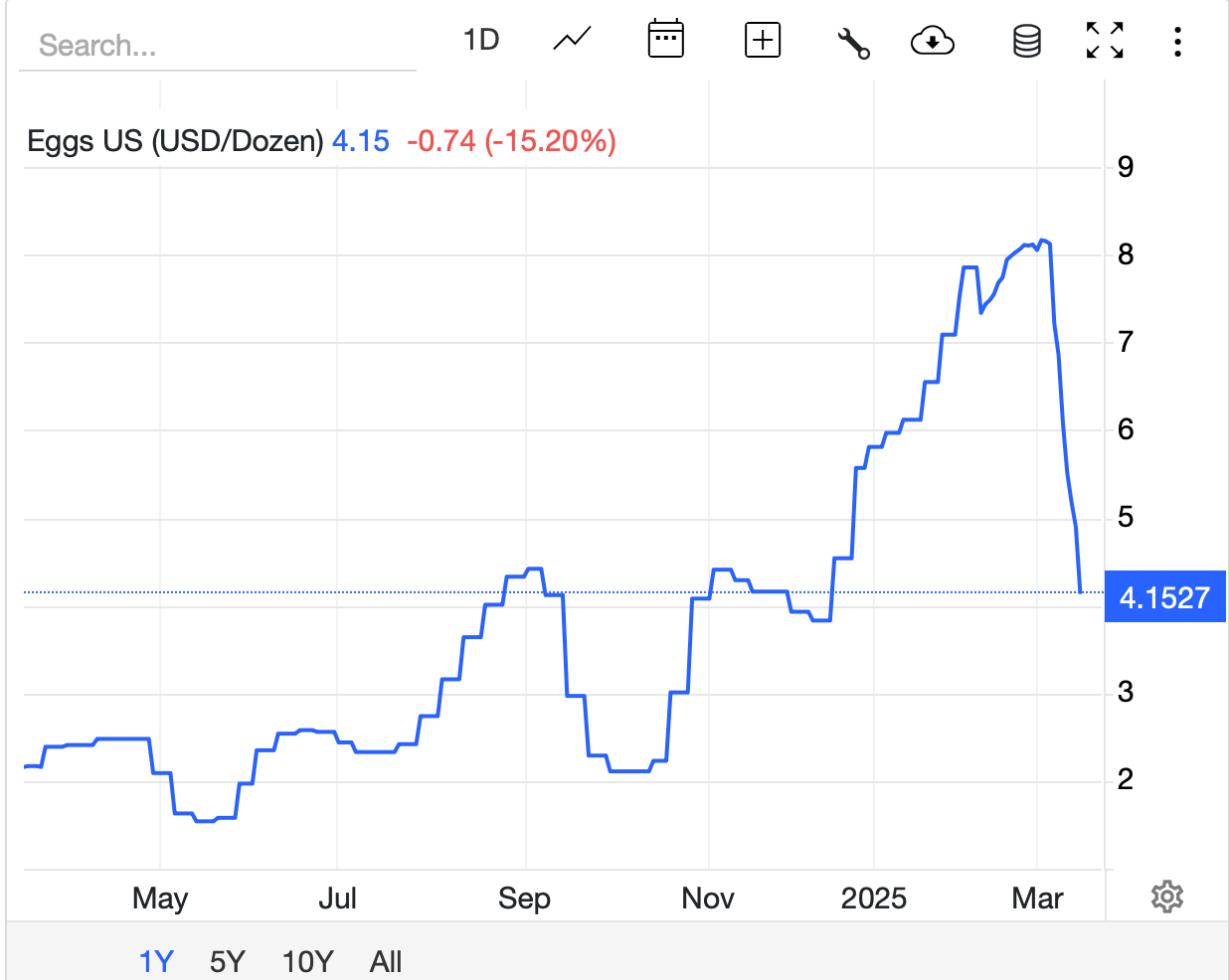
Consumer price inflation is again trending down, after 4 months of increases. (We will see if that was merely seasonal after we get a few more inflation reports).
Industrial manufacturing? Strong. New numbers out today would be a new record high since 2010.
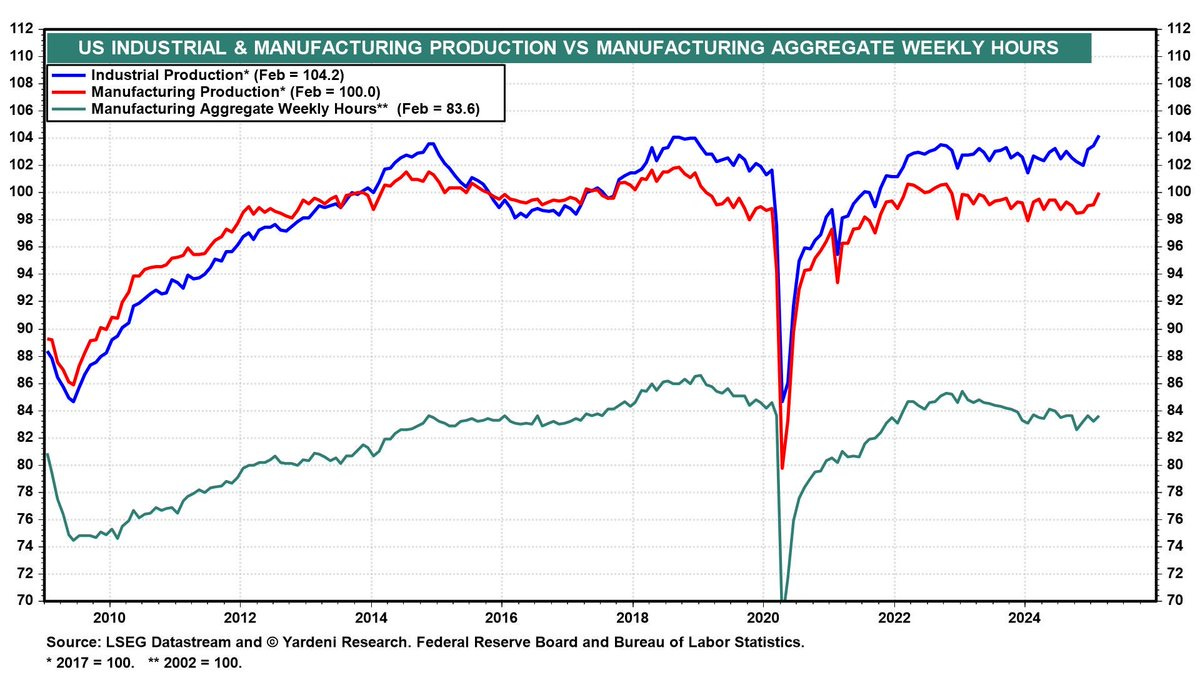
Particularly in tech, durable goods, aerospace, mining, defense….Utilities, food, oil declined (kinda good 😬).
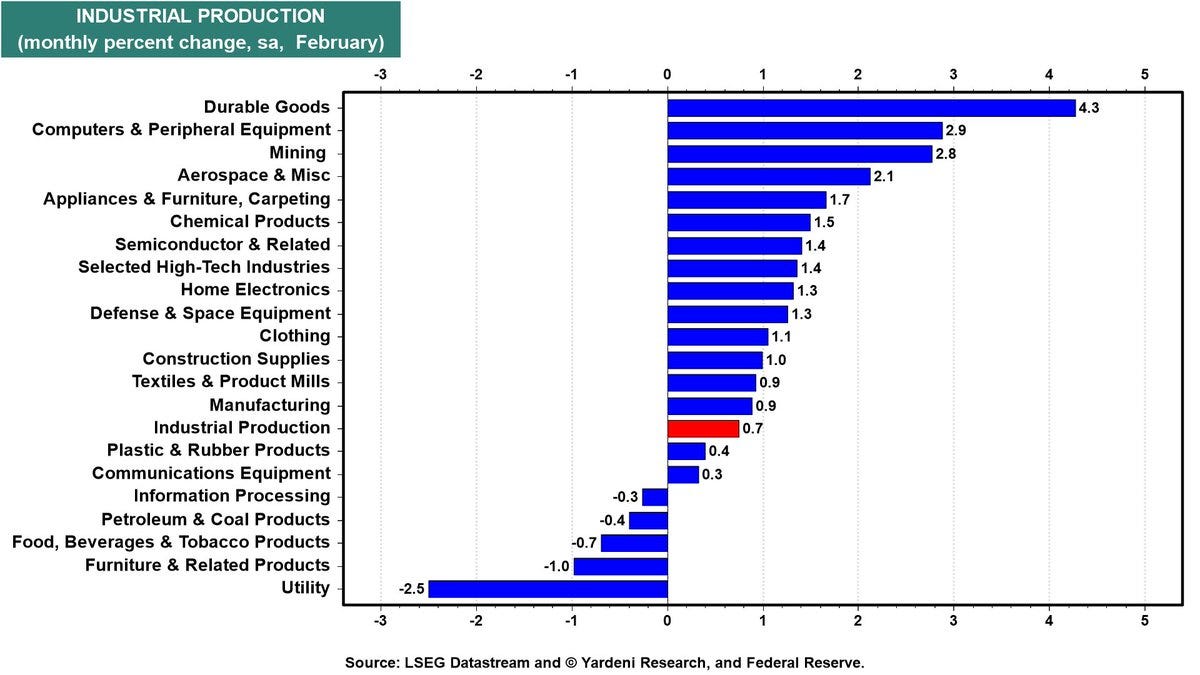
This is all very positive.
Nervous Zeitgeist vibes, what gives?
Well……In my opinion, it’s a few things all at once…
First, something in economics that is hard for folks to comprehend: inflation may be down, but prices are permanent.
And high prices compared to just ~2 years ago - mixed with the perception of a chaotic government strategy - have ignited a fire in the news media, which has, in turn, spooked the consumer. All this while the fundamental risk to the economy lurks under the surface: out of control federal debt and high interest rates.
In my opinion. And despite their presumed good intentions, this Administration is doing a very poor job of messaging their strategy to remove those two underlying risks.
Don’t get me wrong, as I have written about before, I am a heeeuge proponent of the DOGE spending reduction effort, and even limited tariffs as a negotiation tool (not to be used long term, I am a free trade kinda guy). But the marketing/messaging has been erratic and not helpful. Unless that is their intent to further negotiations? Could be. Not what I would do but a plausible strategy.
This man recommends a refocus on risk, and IMO that is federal deficits/debt and interest rates (keep reading). The Administration should also address the American people directly and clearly so we get what the hell we are trying to do here. What’s the end state? You don’t need to give away your tactics, just tell us where you are taking us on this bumpy bus ride. We’ll go along if we understand. Otherwise, we will see much market volatility and perhaps an inadvertent recession, evoked by consumer pessimism.
Negative sentiment can become a self-fulling prophecy, especially when the news media and doomers on Twitter, Facebook, TikTok…. are using their mini-phones to influence perceptions.
Volatility is an expression of uncertainty about the future.
The market is definitely feeling uncertain.
The real issue: our spending and inflation debacle
How did we get here? It's a long story, and fortunately, I’ve already written it :). You can read all about it for background here: previous article. But, if you are not that patient (I don’t blame you); in short, the government likes to spend its way out of recessions instead of taking its medicine, setting us up for future, deeper recessions and inflation. It’s a toxic cycle.
This Administration, to their credit and despite my past criticism, is trying to get US deficits under control. And that, combined with an aggressive posture in foreign policy and trade, has spooked markets / investors / media talking heads / small businesses / my mom …. It can all be a bit overwhelming, admittedly.
And again, their communication sucks more than a couple on the edge of divorce.
Sentiment and the wealth effect matter to markets (as I wrote about last week). We need to get out of this pessimistic economic sentiment funk.
Why getting spending under control is so important
Did you know?… Just the interest on our $36 trillion debt is now costing $1.2 trillion PER YEAR?
AH!
This makes the interest on the debt the 3rd largest federal spending item, behind just Social Security and Medicare, recently eclipsing defense and health care spending, and is taking the inside corner on a path to race past Medicare.
AH AH!
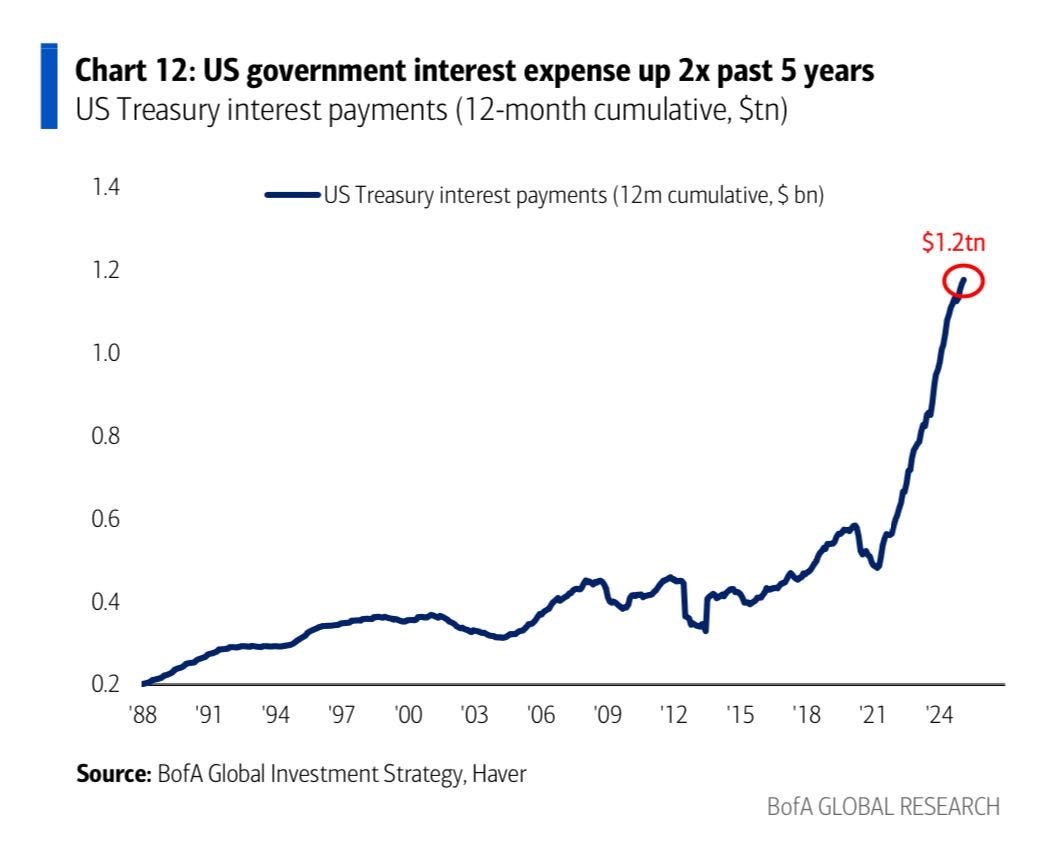
And look who just noticed this, literally as I was looking it up and pasting this chart in my newsletter (wild coincidence!).
Mr DOGE himself.
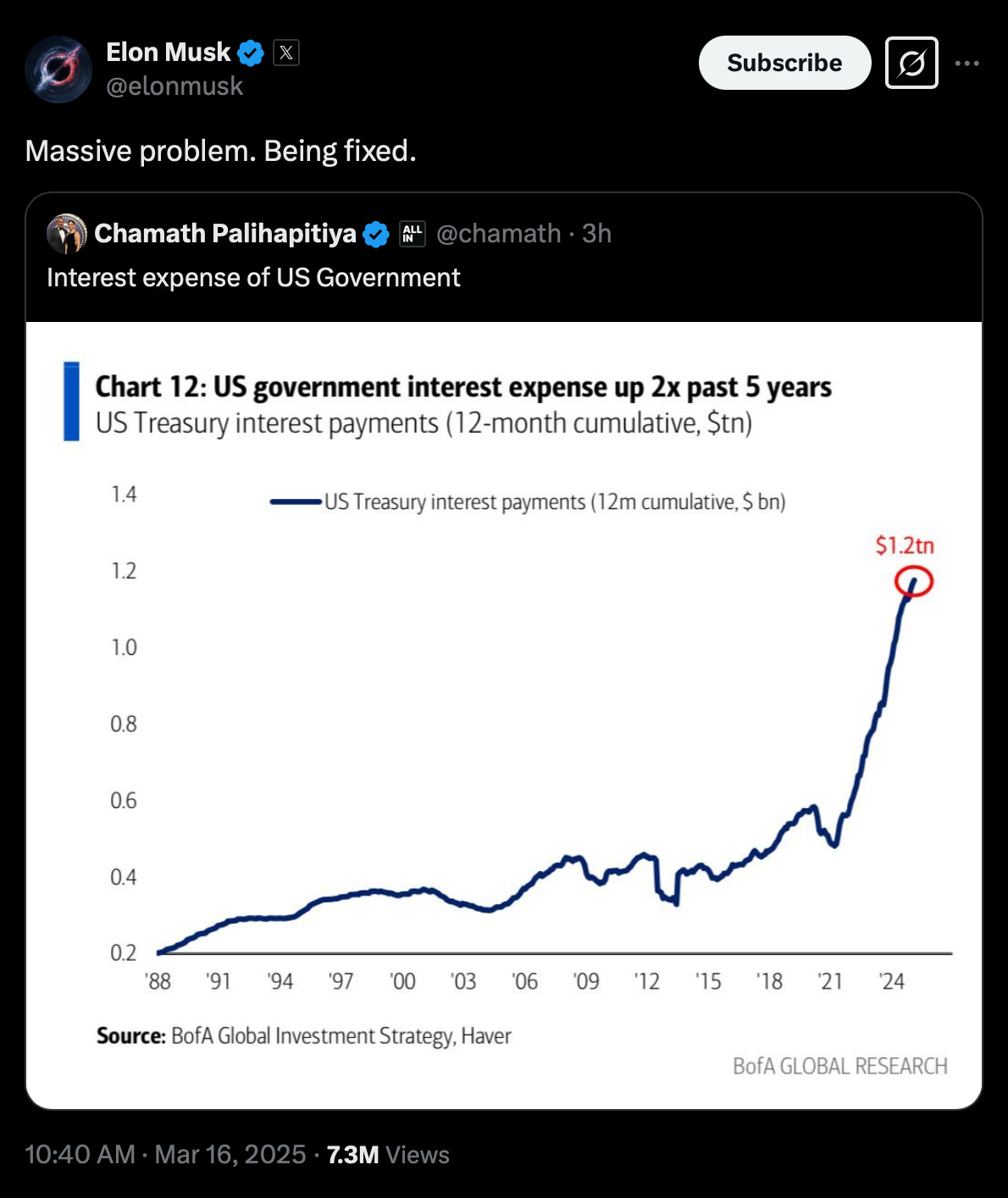
The debt is growing / accelerating. Why?
When I say “out of control” I mean it.
A quick primer. When US federal spending exceeds revenues (which it always does), the Treasury finances the deficit spending by issuing debt in the form of Treasury securities (T-bills, notes, paper, bonds… all kinds of fun names depending on maturity). These are then sold to investors, including individuals, institutions, foreign governments, and even the Federal Reserve.
Mechanically, the Treasury does this by conducting regular auctions through the Bureau of the Public Debt, effectively borrowing money to bridge the gap between revenue and expenditure.
The Treasury then manages the debt, ensuring interest payments are made on time and maturing securities are redeemed or rolled over (aka refinanced) into new debt.
Interest rates are high today, not just for us mind you, but even for the Treasury.
The U.S. Treasury refinances its debt through a systematic process involving the issuance of new Treasury securities to pay off maturing ones. This is normally a routine operation to manage the federal government's borrowing needs and ensure it can meet its financial obligations.
But when you mix high interest rates with large deficits, the debt starts to compound at a much faster clip.
And then this happened.
Former Treasury Secretary Yellen Yellen issued A TON of short-term T-bills (Treasuries) during the last Administration, especially at the tail end.
We are now in a very tricky situation. The incoming Treasury will need to refinance much of this short term debt in 2025 and 2026. And if interest rates stay high, our deficit spending will continue to accelerate, snowballing debt levels.
Chart on:

My heart hurts when I look at that chart. Look at all that 2-year paper. Holy hell.
Why did they do this?
Speculating: Most likely they were on a little hopeium, banking on interest rates coming down. But they didn’t do much to engender a change. Or perhaps they wanted to avoid negative economic reprecussions in an election year? By issuing a colossal load of short-term bills, Yellen likely suppressed bond volatility in an election year. Both reasons are not great. Hope is not a strategy, and the latter would be some pretty gross politics, sandbagging the next Administration.
To paraphrase the great film Wedding Crashers…

Or, to be slightly more cynical, as famed investor Stanley Druckenmiller put it,
"When rates were practically zero, every Tom, Dick and Harry and Mary in the United States refinanced their mortgage, corporations extended. Unfortunately, we've had one entity that did not and that was US Treasury. Janet Yellen, I guess, because of political myopia, whatever, was issuing two years at 15 basis points when she could have issued 10 years at 70 basis points, or 30 years at 180 basis points. I literally think if you go back to Alexander Hamilton, it was the biggest blunder in the history of the Treasury. I have no idea why she has not been called out on this. She has no right to still be in that job."
Warren Buffett agrees with this sentiment, and saw this way back in 2017, speaking in his folksy way:
“Well, I think that when rates have been where they’ve been the last five or six years, or even a little longer, selling very long bonds makes sense for the same reason I think it’s dumb to buy them. I wouldn’t buy a 50-year bond, you know, in a million years at these rates. So if it’s that dumb for me to buy it, it’s probably pretty smart for the entity to sell them if I’m right. So I would say that the Treasury – I would’ve been – there’s a lot of considerations they have. But I would be shoving out long bonds.”
Ouch, now that’s a couple of bad burns.
Treasury is focused on interest rates
To his credit, as I wrote about last week, this is why the current Treasury Secretary Bessent is laser-focused on getting interest rates down, especially the long end of the yield curve, ie the 10-yr treasury. Refinancing that short-term paper is going to be very expensive for everyone: from the governemnt to homebuyers.
“We are not focused on whether the fed is goin to cut [or] not cut, what we are focusing on is lowering rates…the 10yr is the important price to focus on…it’s mortgages, it’s long term capital formation…I think the 10-yr will naturally come down… and on top of it, what if we do get some big savings from the DOGE program?” - Treasury Secretary Scott Bessent
Does the Fed now have a good reason to cut rates?
Perhaps yes, which is something I would not have said a few weeks ago. The vibe / sentiment shift in the last 14+ days could actaully be positive for interest rates.
Will they? Not right away, not at the next meeting, IMO. But the chances of them cutting in 2025 just went way up. A 25% chance of a cut in May and a more than 50% chance of 3 rate cuts this year, per the futures market.

All this matters for real estate
No matter the way the winds are blowing, there is always an opportunity when you own assets, and I choose real estate. Today’s fear is driving a flight to safety, which continues to lower mortgage rates.
Today the 30-yr mortgage rate is down to 6.80%.
My Skeptical Take:
I see 5% interest rates in our future. And timing couldn’t be better.
30-yr mortgage rates have been above 6% since 2022.
As a result, existing homes have been in a sales recession.
But, this does look like it coudl be making a bottom!
Much like the low point in the 1980s. Are we ready to rebound? If interest rates get into the 5s% then YES I think so. A flood of demand for homes will hit. Home demand (unlike home supply) is very elastic. Folks are highly responsive to interest rate changes.
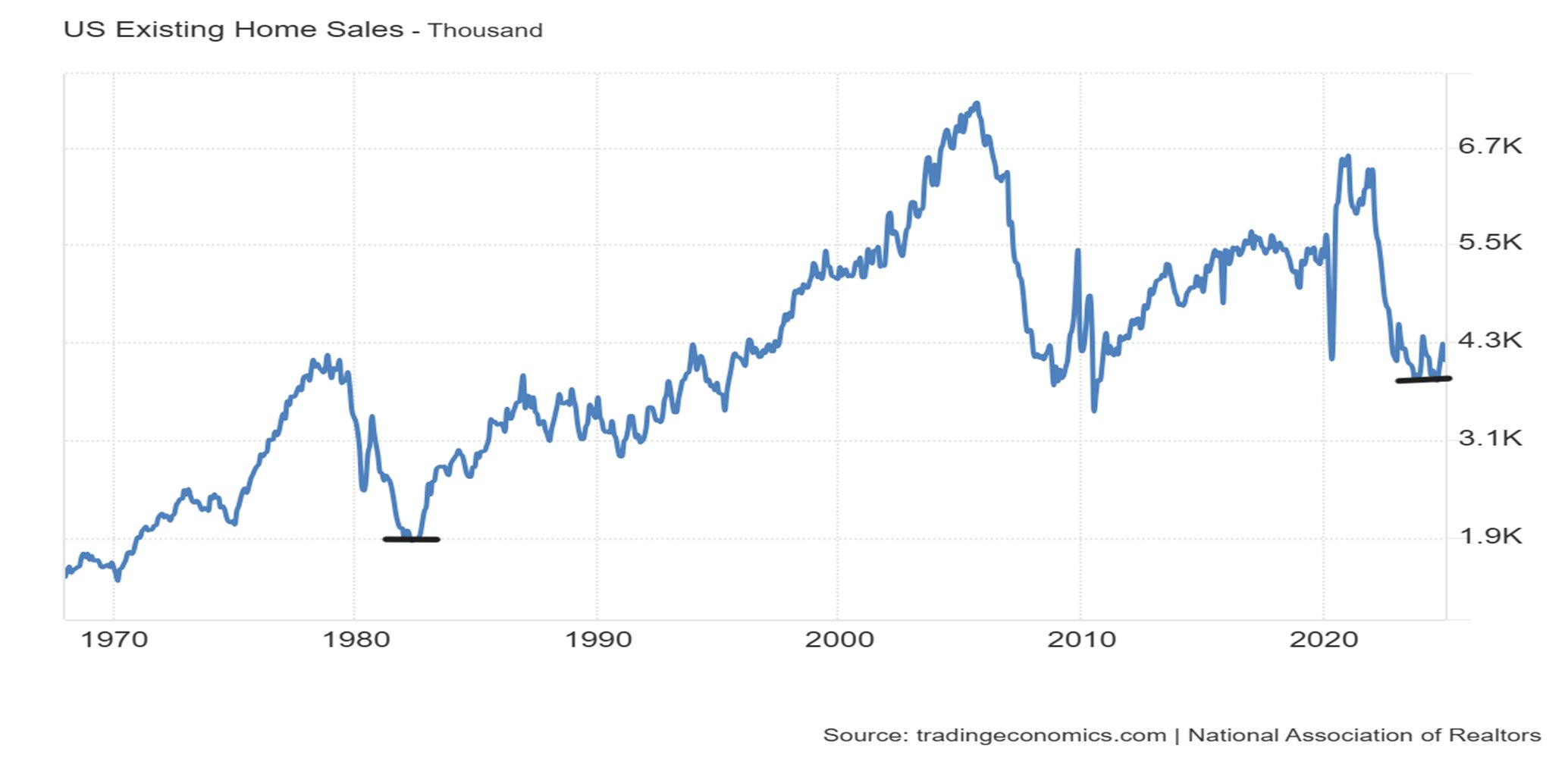 Credit @LoganMohtashami
Credit @LoganMohtashamiBut it may take 6+ months for inflation levels to become clear to the market and for us to get through the “growing pains” of the current political tumult.
The good news: it is cheaper today than yesterday, and cheaper yesterday than a month ago, to buy a piece of property. Mortgage rates have been down each week since November, and continue to tick lower. Remember, lowering interest rates is the current proclaimed mission of this US Treasury Dept. and they are following through on this plan, albeit with crap communications and “growing pains.”
The bad news: growing pains aren’t fun, but likely necessary for…well growth! We have been trying to avoid them for too long with too much goverment stimulus and the chickens have come home to roost (damn I wish I had some backyard chickens in this egg shortage! Where are all the Vital eggs? Love those damn things. The yolk is golden, not bright yellow like a Waffle House Chernobyl egg).
My posture is positive. With a skeptical eye on the political and media noise. Watch the potential peace deal in Russia, a new Iran agreement/sanctions, new moves from the Treasury, DOGE spending cuts, and tariffs coming down IF they can negotiate a long term end state. Department and Defense and Health are next on the DOGE docket. Maybe it’s finally time to scrap the $2+ trillion F-35 , and finally rout out the billlion in waste and fraud in our health care system?
These would be highly satisfying and disinflationary for markets.
Until next time. Stay Curious. Stay Skeptical.
Herzliche Grüße,
Andreas Mueller
PS - Want to talk real estate with another awesome investor? Drop me a DM!




Comments